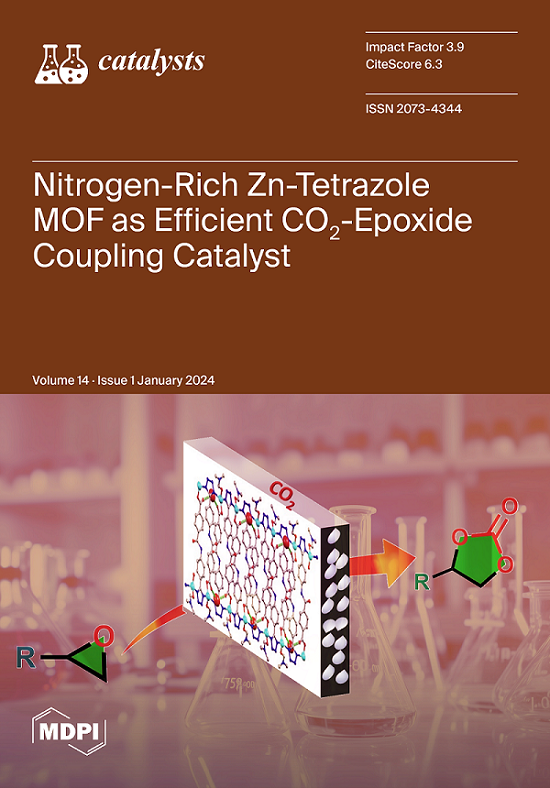与 SAPO-34 沸石混合的双功能混合 FTS 催化剂在 GTL-FPSO 工艺中的应用
IF 4
3区 化学
Q2 CHEMISTRY, PHYSICAL
引用次数: 0
摘要
气变液(GTL)工艺是一种在燃料生产过程中实现碳中和的催化技术。费托合成(FTS)是该工艺的核心步骤,可将合成气(CO + H2)转化为高价值的碳氢化合物产品。本研究采用传统的水热法和湿法浸渍法,分别合成了茶苯矿形沸石和 Co/γ- 氧化铝催化剂。然后,将 Co/γ-umina 催化剂与支持物混合制备混合 FTS 催化剂,支持物包括单独合成的沸石和商用沸石,以及以不同比例混合的沸石。研究了这些沸石对 FTS 转化率和选择性的影响。此外,还分析了支撑物和制备的催化剂的理化性质。在固定床反应器中对双功能混合催化剂的性能进行了评估,并使用在线和离线气相色谱法对 FTS 产物进行了分析。与单独使用 Co/γ- 氧化铝催化剂相比,混合催化剂产生的烃类较轻。同时,Co/γ-氧化铝催化剂产生的重碳氢化合物在硅铝磷酸盐沸石(SAPO-34)的酸性位点上发生加氢裂化,生成更轻的燃料范围碳氢化合物。此外,还对钴基混合 FTS 催化剂进行了研究,以确定实现高碳转化率和 C5+ 选择性的最佳支撑比。以 SAPO-34:ZSM-5 (2:8) 为载体的混合催化剂具有最高的 CO 转化率和良好的 C5+ 选择性。本文章由计算机程序翻译,如有差异,请以英文原文为准。
Bifunctional Hybrid FTS Catalyst Mixed with SAPO-34 Zeolite for Application in the GTL-FPSO Process
The gas-to-liquid (GTL) process is a catalytic technology for achieving carbon neutrality during fuel production. Fischer–Tropsch synthesis (FTS), a core step in this process, converts synthesis gas (CO + H2) to high-value hydrocarbon products. This study synthesized a chabazite-shaped zeolite and a Co/γ-alumina catalyst by using conventional hydrothermal and wet impregnation methods, respectively. Hybrid FTS catalysts were then prepared by mixing the Co/γ-alumina catalyst with supports, including the synthesized and commercial zeolites alone and mixed at various ratios. The effects of these zeolites on the FTS conversion and selectivity were investigated. Additionally, the physicochemical properties of the supports and prepared catalysts were analyzed. The bifunctional hybrid catalyst performance was evaluated in a fixed-bed reactor, and the FTS products were analyzed using online and offline gas chromatography. The hybrid catalysts produced lighter hydrocarbons than the Co/γ-alumina catalyst alone. Meanwhile, heavy hydrocarbons produced over the Co/γ-alumina catalyst were hydrocracked at the acid sites of the silicoaluminophosphate zeolite (SAPO-34) to yield lighter, fuel-range hydrocarbons. Cobalt-based hybrid FTS catalysts were also investigated to determine the optimum support ratio for high carbon conversion and C5+ selectivity. The hybrid catalyst supported on SAPO-34:ZSM-5 (2:8) exhibited the highest CO conversion and favorable C5+ selectivity.
求助全文
通过发布文献求助,成功后即可免费获取论文全文。
去求助
来源期刊

Catalysts
CHEMISTRY, PHYSICAL-
CiteScore
6.80
自引率
7.70%
发文量
1330
审稿时长
3 months
期刊介绍:
Catalysts (ISSN 2073-4344) is an international open access journal of catalysts and catalyzed reactions. Catalysts publishes reviews, regular research papers (articles) and short communications. Our aim is to encourage scientists to publish their experimental and theoretical results in as much detail as possible. Therefore, there is no restriction on the length of the papers. The full experimental details must be provided so that the results can be reproduced.
 求助内容:
求助内容: 应助结果提醒方式:
应助结果提醒方式:


